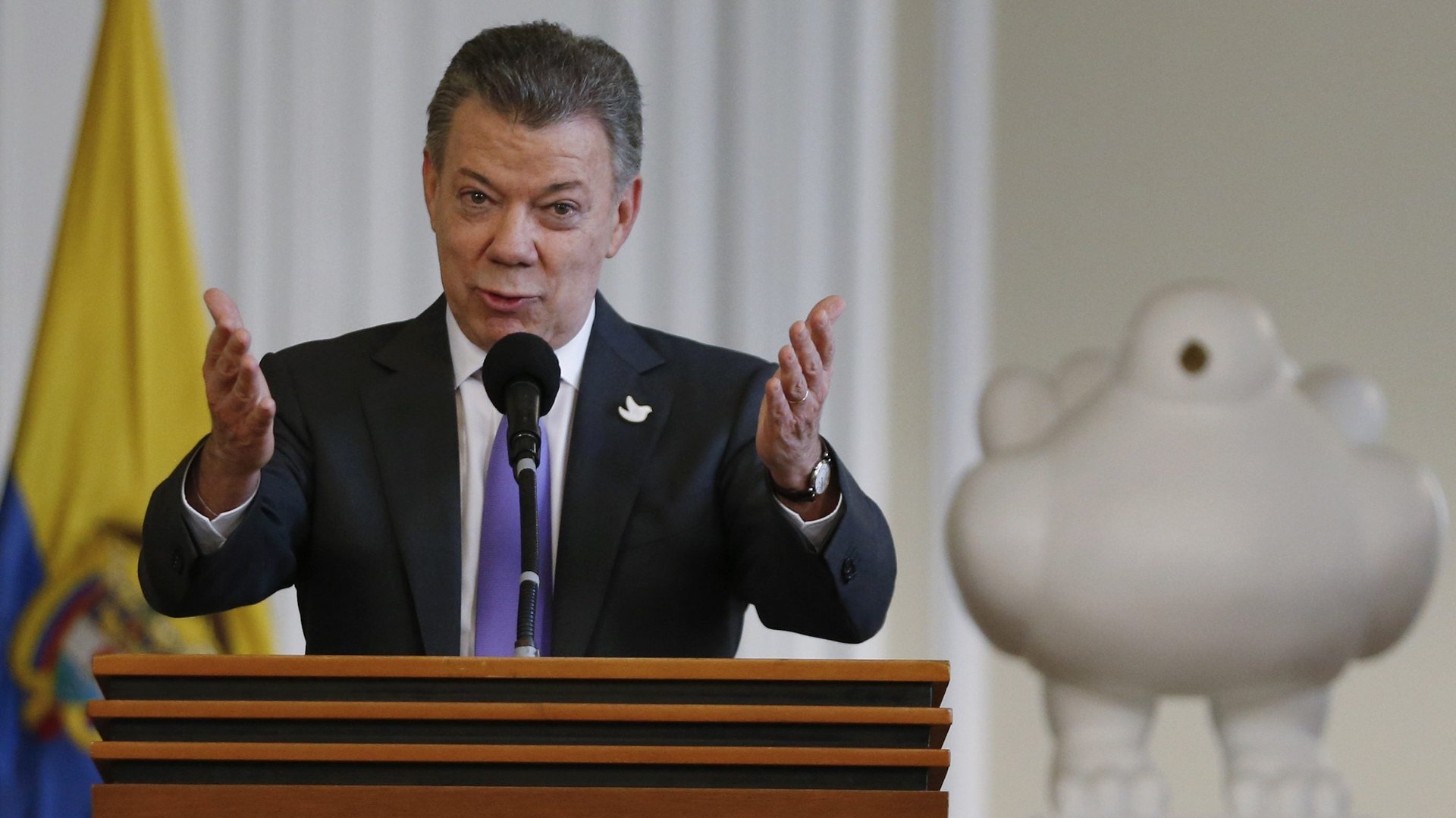Colombia and the FARC have another peace deal, and this one’s not being left up to a referendum
Colombian president Juan Manuel Santos and representatives from FARC have hammered out another peace deal to replace one that was rejected through a plebiscite Oct. 2. This time, they’re not asking the Colombian people to weigh in directly.


Colombian president Juan Manuel Santos and representatives from FARC have hammered out another peace deal to replace one that was rejected through a plebiscite Oct. 2. This time, they’re not asking the Colombian people to weigh in directly.
The negotiating parties are set to sign the new agreement to end the country’s 52-year civil war on Nov. 24. It will then go straight to congress for approval.
“Lives have been lost and many more are in danger,” said Santos in a video address (link in Spanish) on Nov. 22. “We have to act. There’s no time to lose.”
It took the negotiating parties four years of talks in Havana, Cuba to come up with the original deal (Spanish), a 297-page document that addressed how guerrilla members would be brought to justice and victims restituted. It was also an ambitious plan to redefine power structures in Colombia, giving civil groups lots of room to weigh in on policy making. It contained an agrarian reform plan. It sought gender equality.
And it proved to be too revolutionary for the slight majority of Colombian voters: 50.2% voted “no” vs. 49.8 for “yes.” But a whopping 62% of eligible voters didn’t show up at the polls.
The plebiscite results were a shock to president Santos, who just a few days before had signed the agreement with the FARC with great fanfare. Still, almost immediately after the results came in, he was meeting with “no” supporters to hear their concerns. Five days later, he won the Nobel Peace Prize.
Last week, his government and FARC unveiled their new deal. It contains 273 changes (Spanish) from the initial version, per political analysis site La Silla Vacía. (The outlet put together a detailed spreadsheet with every single change, including information on who requested it and its magnitude.)
They include ratcheting back opportunities for citizen participation to address fears that too much of that could paralyze decision-making. It also makes it more difficult to prosecute people who funded the paramilitary groups, including businessmen who paid them for protection. Under the original deal, anyone who had a “habitual or determinant participation” in crimes committed by paramilitaries was subject to prosecution. That language has been changed to “active and determinant participation,” raising the bar on who is prosecutable, according to La Silla‘s analysis.
The original agreement heavily emphasized gender to address crimes perpetrated against women during the conflict, and also acknowledged the rights of the LGBT community. But Catholic and Evangelical Christians interpreted it as a government push to promote “gender ideology,” a concept conservatives invented as shorthand for gay marriage, sexual education in schools, and other liberal policies they abhor. So in the new version, phrases that included the term “gender,” which had agitated the religious far right, were modified so as not to offend their sensibilities. In one section, for example, “gender equality” was substituted with “equal opportunity for men and women.”
Despite all this, some, including former president Alvaro Uribe, a prominent leader of the “No” campaign, say the revised text still doesn’t assuage all their concerns. His party, the Democratic Center, has called the decision to send what it perceives to be an imperfect deal to congress “an outrage” (Spanish) and is vowing to fight it.
Santos has dismissed that kind of criticism, saying that another plebiscite campaign “would dangerously divide the country.” Congress, he added, is the most legitimate and convenient way to ratify the agreement. It also appears Santos has the congressional votes he needs, but he should know better not to count on it.